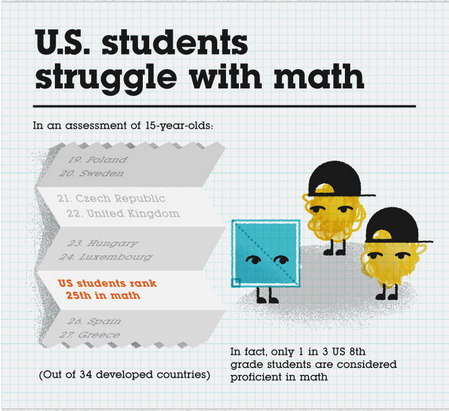"Whether you love it or hate it, if you’ve partaken in the American school system, there’s no doubt that you’ve studied math in a wide range of forms and subjects. From algebra to geometry to the rigor of calculus, math is something that is a part of the average student’s life from kindergarten to college."
Get Started for FREE
Sign up with Facebook Sign up with X
I don't have a Facebook or a X account
 Your new post is loading... Your new post is loading...
 Your new post is loading... Your new post is loading...
|

Laura Jane's curator insight,
December 16, 2013 2:03 PM
As Ms. Dichter already stated, this article draws an interesting comparison between our belief that math anxiety doesn't start until sixth grade with the overwhelming reality that we're seeing symptoms of anxiety as early as first grade. This SchoolBook article gives an interesting example, a 7-year-old girl named Zoey, who excels in reading, but struggles in math. The pressure that her parents put on her largely contributes to her anxiousness. The article gives a multitude of ideas for how to combat math anxiety, even beginning as young as first grade. Constantly providing reassurance, demonstrating patience, and exhibiting that it's okay to not get something on the first try are all suggestions that I hope to implement in my own classroom. |











This infographic explores math in America. Did you know that 1 in 5 Americans is "functionally innumerate"? What does this mean? Sixty-two million Americans cannot do basic math such as adding fractions, working with measurement or doing whole number problems.
Learn about how other countries compare to the U.S., how the U.S. compares to Singapore and South Korea in terms of "high achiever", what happens when we "hate" math, and what could be done to help the next generation succeed in math.